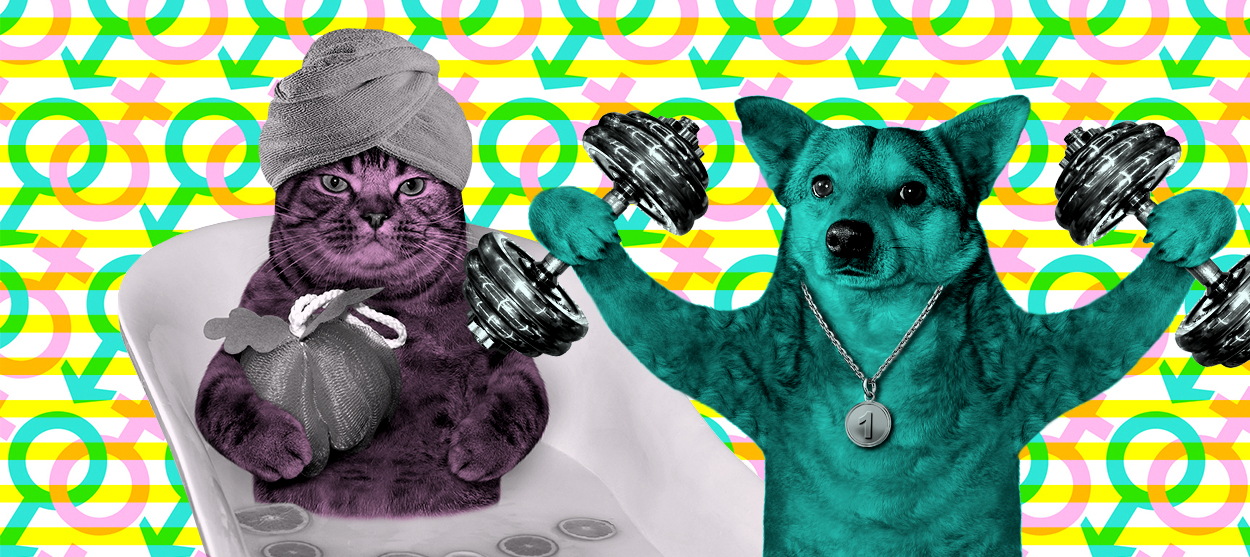Dogs are from Mars, cats are from Venus
Not even our pets are untouched by society's gender stereotypes


Here in the U.S., a lot of us are suddenly spending a lot more time at home with our pets. My social media feed is filling up with photos of furry coworkers, supervising or napping or begging for attention. As I type this, my own office manager — a glossy black house panther — is lying directly in front of my laptop, front paws and chin draped over my wrist, dozing.
Based on my description above, you have probably already assigned my cat a gender in your mind. We all do this; it's social conditioning. And I've noticed that when my cat comes up in conversation, a lot of people default to feminine pronouns. Even a longtime friend, on a video call a few days ago, responded to the appearance of the fuzzy interloper on screen with, "Oh, how is she doing?!"
My cat doesn't care; he has no concept of gender. But because we humans have designated him male, I've found it fascinating how often people who know his gender — even me! — will slip up and refer to him with the "wrong" pronouns. It's a striking illustration of how, societally speaking, we so thoroughly associate cats with femininity. And because America loves a binary, there has to be a masculine counterpart. Enter: the dog.
The Week
Escape your echo chamber. Get the facts behind the news, plus analysis from multiple perspectives.

Sign up for The Week's Free Newsletters
From our morning news briefing to a weekly Good News Newsletter, get the best of The Week delivered directly to your inbox.
From our morning news briefing to a weekly Good News Newsletter, get the best of The Week delivered directly to your inbox.
This isn't just cabin-fevered handwaving on my part; it's a documented enough phenomenon to have a dedicated page on TV Tropes. And the association of cats with femininity, in particular, goes back well before the feline takeover of the internet. But even though this sounds like a fluffy topic (pun only slightly intended), I can't help noticing something serious at work. As we've associated dogs and cats with particular genders, we've also imbued them with the toxic societal characteristics of those genders. And those characteristics track pretty darn closely with the patriarchy's tendency to elevate men and disdain women.
Consider "likability." It's not just a buzzword for female presidential candidates; it shows up on the end of a leash, too. How many of us would be brave enough, in mixed company, to declare, "I don't like dogs?" Whenever I see someone do this — always tentatively, apologetically — people are primed to shout them down. How can you not like dogs? Everyone likes dogs! There are strange parallels here to the assumption that every single woman is presumed not to have met "the right guy" yet — just as every dog skeptic "hasn't met the right dog yet."
Meanwhile, every cat owner I know has been harangued at length about other people's dislike of cats, including every negative interaction they've ever had with a cat. Even celebrity cat behaviorist Jackson Galaxy, in a 2017 interview, responded to Stephen Colbert's characterization of cats as aloof and unloving with, "That's why I have dogs!"
This isn't surprising, exactly. Dogs have been deliberately bred to orient themselves around humans' moods and desires, whereas cats more or less domesticated themselves (and might not even be that domesticated anyway). And in a vacuum, associating an eager-to-please companion animal with men and a self-possessed one with women might not be a huge problem.
A free daily email with the biggest news stories of the day – and the best features from TheWeek.com
But that's not the end of it; we also saddle these animals with the toxic stereotypes on which our patriarchy runs. Think of all the negative feline terminology that's attached to femininity: "catty" meaning mean-spirited or spiteful, or referring to street harassment as "cat-calling," or the inevitable appending of "crazy" to the moniker of "cat lady," or even the use of "pussy" as a vulgar euphemism for female genitalia. Meanwhile, the broad caricature of dogs, as well as men, ranges from dim-witted uselessness to snarling aggression. A man who likes cats is seen as aberrant, because toxic masculinity holds that men must not ever be seen as feminine.
It's also worth noting that this gendered compartmentalization extends even further. When I asked my friends about their experiences with people making gendered assumptions about their pets, the responses were decidedly mixed. But several people noted that larger working dog breeds — like retrievers or pit bulls — were more likely to be presumed male, whereas small fluffy lap dogs were more frequently presumed female. (Think of all the gendered stereotypes attached to these particular breeds, as well!)
In the grand scheme of things, this is small, cute, easily dismissed. But in a society where women and men are presumed to be antagonists, it matters that we've cast cats and dogs in the roles that we have. When we project gendered qualities onto animals, we subtly normalize them for ourselves.
So as we're all spending more time with our pets these days, it's a good opportunity to practice checking our assumptions. In between the head-scratches and play sessions, of course.
Want more essential commentary and analysis like this delivered straight to your inbox? Sign up for The Week's "Today's best articles" newsletter here.
Zoe Fenson is a freelance writer based in the San Francisco Bay Area. Her writing has appeared in Longreads, Narratively, The New Republic, and elsewhere. When she's not writing, you'll find her doing crossword puzzles in cocktail bars or playing fetch with her cat.
-
 High Court action over Cape Verde tourist deaths
High Court action over Cape Verde tourist deathsThe Explainer Holidaymakers sue TUI after gastric illness outbreaks linked to six British deaths
-
 The battle over the Irish language in Northern Ireland
The battle over the Irish language in Northern IrelandUnder the Radar Popularity is soaring across Northern Ireland, but dual-language sign policies agitate division as unionists accuse nationalists of cultural erosion
-
 Villa Treville Positano: a glamorous sanctuary on the Amalfi Coast
Villa Treville Positano: a glamorous sanctuary on the Amalfi CoastThe Week Recommends Franco Zeffirelli’s former private estate is now one of Italy’s most exclusive hotels
